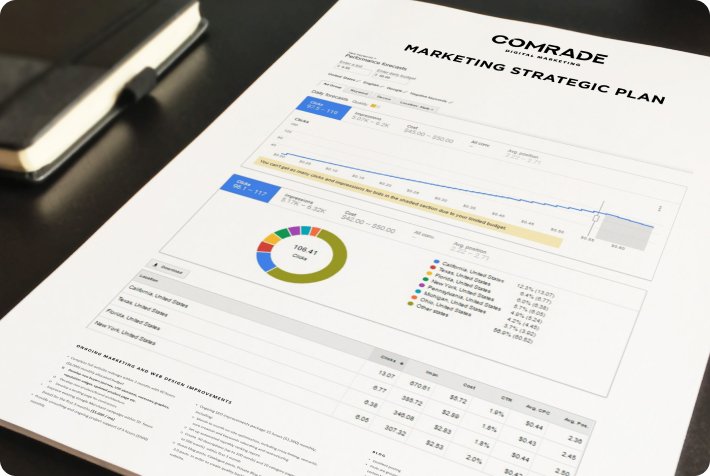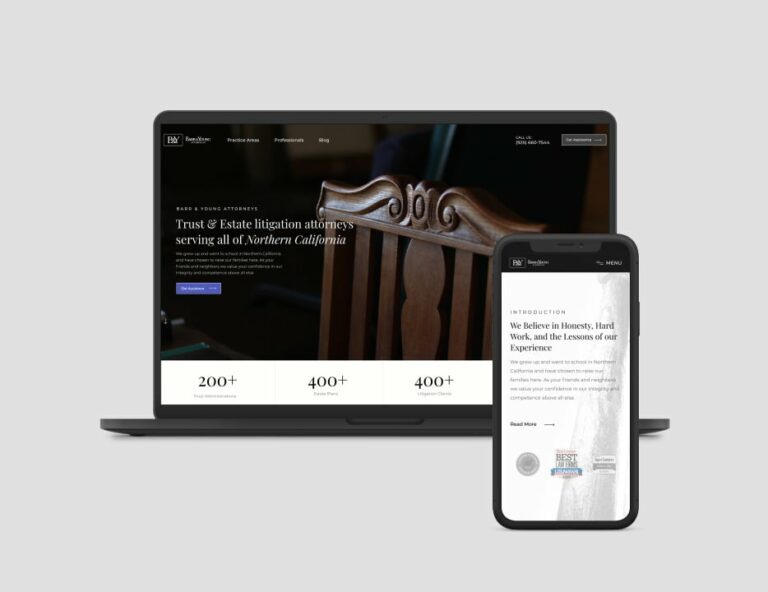
Creating effective online marketing campaigns is easier said than done. It takes a team of digital marketing campaign experts to achieve key performance indicators within an online marketing plan timeline. If you’ve never executed a marketing campaign before, you probably won’t know exactly when to implement certain tactics and how long you need to achieve specific campaign goals.
To give you a better idea, we’ve broken down a 5-8 week process into four easy-to-follow steps to illustrate what goes into launching a complete, effective internet marketing campaign.
What Is a Marketing Timeline?
A marketing timeline provides an overview of all the initiatives, activities, promotions, and revenue-generating events that will take place throughout the year, enabling your entire marketing team to access this information. It can be used to set deadlines on a per-project, quarterly, or annual basis.
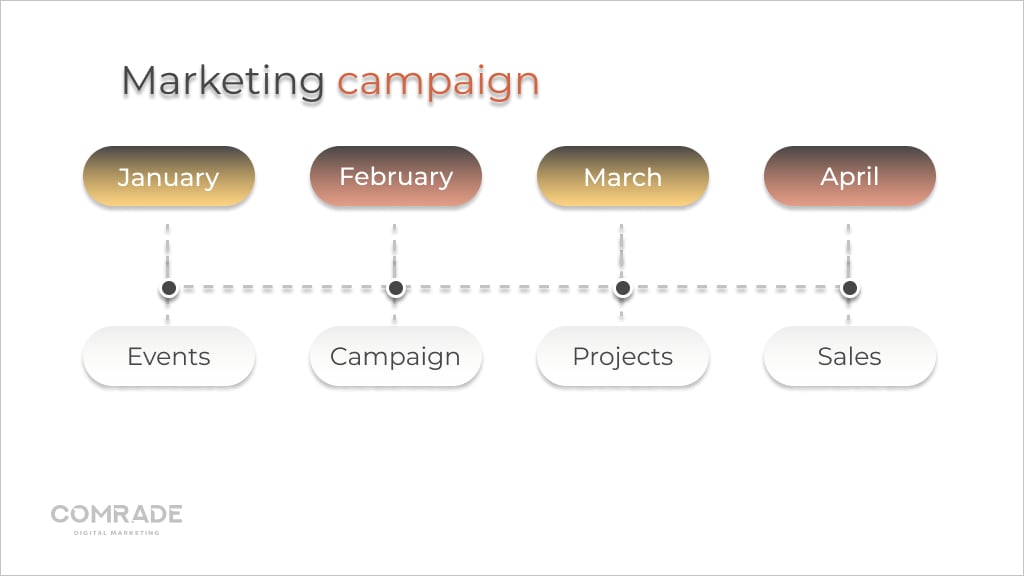
Marketing is critical to all business success; however, it’s also a sizeable investment for most. Understandably, productivity and subsequent ROI become a key concern for business owners. Hence, the need for a marketing campaign timeline (a strategic roadmap) to organize, execute, and track marketing strategies.
The components of your marketing timeline will depend on your business goals and the scope of your overall marketing strategy. Generally, it offers a high-level view of the who, what, where, and how of a marketing campaign.
It’s a handy framework for future planning and reviewing the success of your marketing activities. The more thorough your marketing campaign timeline, the more likely you are to achieve your campaign goals.
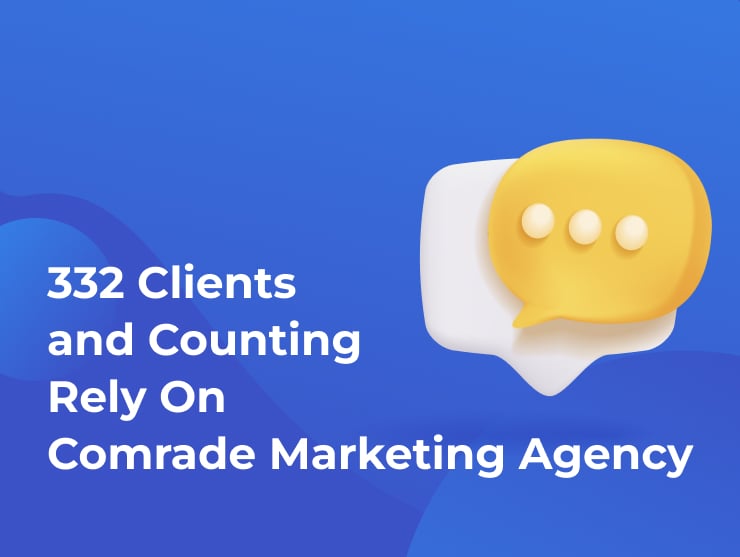
Why Is a Campaign Timeline Important?
Beyond creativity, marketing teams require systems, processes, and tools to execute successful marketing campaigns. A marketing campaign timeline allows you to see your marketing plan over time and organize your projects according to schedule.
Most marketing departments have multiple team members with different roles and responsibilities. Thus, a campaign timeline can be really useful to plan work and communicate goals and deadlines, especially since they are likely working on more than one campaign.
A marketing timeline typically communicates:
- Which projects are coming;
- Which tasks are a priority; and
- When campaign deadlines are.
For example, let’s say you’re a new eCommerce store owner that wants to map out an annual marketing timeline. Implementing a timeline can help you and your team visualize your marketing strategy and break down each project into specific steps with clear deadlines.
Having a marketing timeline keeps your marketing efforts on track by aligning marketing objectives with your business strategy. It helps keep you, and your team, focused on clear objectives, i.e., what tasks need to be done, who is responsible for each task, and what date they must be completed by.
Type of Marketing Projects
The type of marketing project you’re working on determines the length of your campaigns because it determines how you’re planning to run them.
To avoid confusion, it’s better to categorize marketing campaigns into the following categories:
- An overall marketing plan usually spans 1-5 years and is tied to the business plan of the organization.
- An inbound/outbound marketing campaign is a yearly plan of marketing activities that provides you with the opportunity to be more precise about your objectives.
- Individual marketing strategies – SEO, PPC; a detailed plan for your inbound campaign and all of your other campaigns.
Delivering Business Results: Our Digital Marketing Case Studies
What Is a Digital Marketing Campaign?
A digital marketing campaign is a strategic and coordinated effort that utilizes various online platforms and channels to achieve specific marketing goals. It involves implementing a series of online marketing tactics and activities to promote a product, service, brand, or message to a targeted audience.
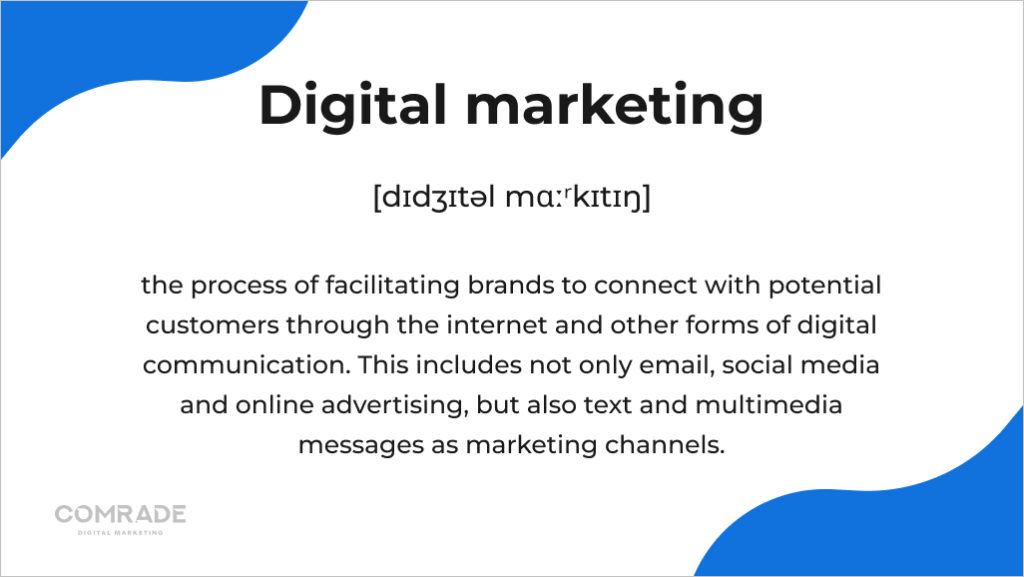
Digital marketing campaigns leverage the power of the internet and digital technologies to reach and engage with potential customers. These campaigns can encompass a wide range of activities, such as search engine optimization (SEO), social media marketing, email marketing, content marketing, paid advertising, and more.
The success of a digital marketing campaign relies on careful planning, precise targeting, compelling content creation, and effective execution. Marketers analyze data and metrics to measure the campaign’s performance and make data-driven adjustments to optimize results.
Overall, a well-executed digital marketing campaign can boost brand visibility, drive website traffic, generate leads, increase sales, and strengthen customer relationships, making it an essential component of modern marketing strategies.
Key Components of a Digital Marketing Campaign
A successful online marketing campaign requires careful planning and execution. Crafting the ideal timeline is essential to achieve your goals effectively. Let’s explore the key components of a digital marketing campaign that contribute to its success:
- Target audience identification: Understanding your target audience is fundamental. Define demographics, interests, and pain points to tailor your marketing messages for maximum impact. Conduct market research and utilize customer data to create buyer personas that guide your campaign’s direction.
- Setting campaign goals and objectives: Establish clear and measurable goals for your campaign. Whether it’s increasing website traffic, lead generation, or sales, defining specific objectives ensures focused efforts and easier evaluation of campaign performance.
- Selecting digital marketing channels: Choose the most relevant digital marketing channels to reach your audience effectively. Options include social media, email marketing, SEO, content marketing, and paid advertising. Align your channel selection with your target audience’s preferences.
- Creating compelling content: Compelling content is the backbone of any digital marketing campaign. Develop engaging and valuable content, such as blog posts, videos, infographics, and downloadable resources, to attract and retain your audience’s attention.
- Implementing tracking and analytics: Measure the success of your campaign with tracking and analytics tools. Monitor key performance indicators (KPIs) like website traffic, conversion rates, and engagement metrics. Use the data to optimize your strategy and achieve better results.
By integrating these key components into your online marketing campaign timeline, you can maximize its efficiency and impact, ensuring a successful digital marketing journey.
What Does a Digital Campaign Include?
We can summarize a digital campaign as follows: An online marketing effort made by a company to drive engagement, conversions, traffic, or revenue. A marketing campaign ties in with overarching business goals and includes one or more digital channels.
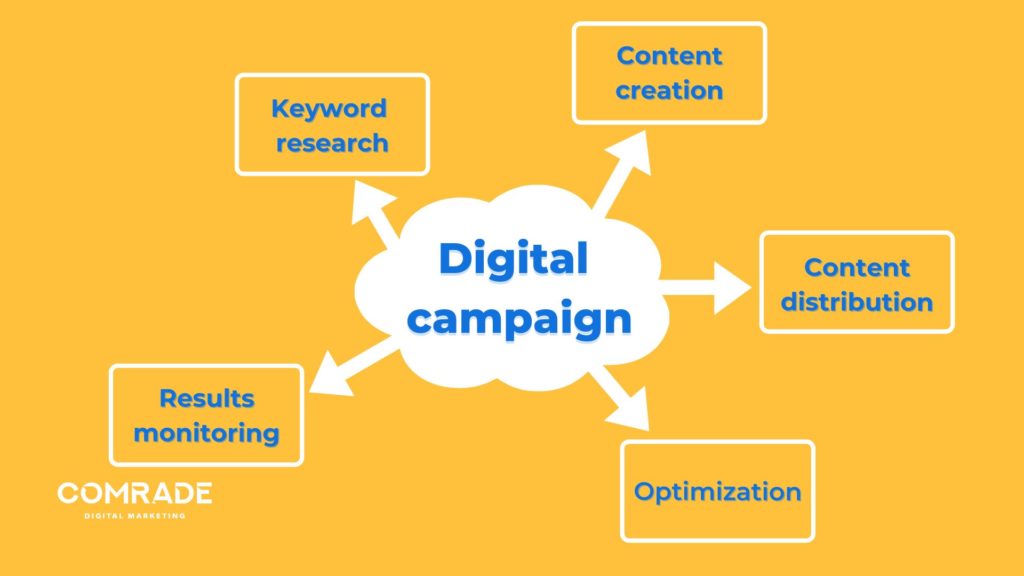
It’s common for companies to implement multiple campaigns throughout the year. Some campaigns invest heavily in search engine optimization to generate organic traffic, whereas others utilize pay-per-click marketing to quickly boost sales.
Therefore, each digital marketing campaign will include slightly different tactics. However, all entail:
- Keyword research
- Content creation
- Distributing content on a company’s website or via email, social media, or search engines
- Monitoring and analyzing results
- Optimization based on real-time analytics feedback
While most digital marketing campaigns are ultimately geared towards the bigger picture of improving revenue, they don’t all have the same goals. Varied objectives may include increasing conversions, boosting organic traffic, customer acquisition, and brand awareness.
Digital Marketing Campaign Timeline Example
A well-structured and thought-out marketing campaign timeline is crucial for the success of any online marketing initiative. It provides a roadmap that guides marketers through the various stages of planning, executing, and evaluating their campaigns.
By following a strategic timeline, businesses can effectively allocate resources, track progress, and make informed decisions to optimize their marketing efforts. In this section, we will explore an ideal online marketing campaign timeline and the key steps involved at each stage.
Overview of a Marketing Campaign Timeline
A well-planned marketing campaign timeline is essential for a successful online marketing strategy. It provides a structured approach to guide businesses through each stage of the campaign, from pre-campaign preparation to post-campaign analysis. Let’s explore the key phases in an ideal online marketing campaign timeline.
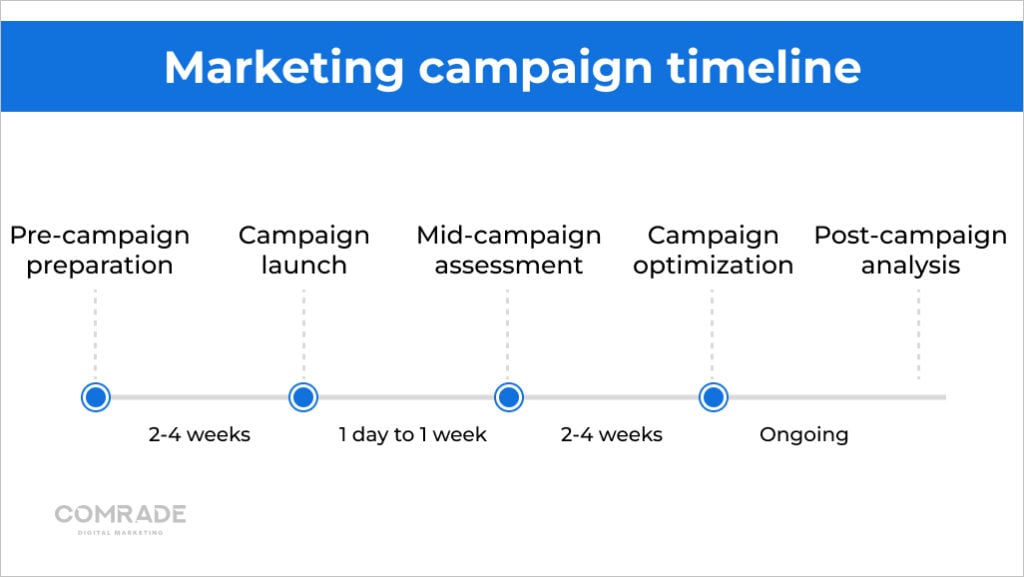
- Pre-campaign preparation (2-4 Weeks): During this phase, businesses conduct thorough market research, define campaign objectives, identify target audiences, and develop a comprehensive marketing plan. This includes creating engaging content, designing appealing visuals, setting up tracking mechanisms, and establishing key performance indicators (KPIs) to measure success.
- Campaign launch (1 day to 1 week): Once the preparation is complete, it’s time to launch the marketing campaign. This involves implementing the planned strategies across various channels, such as social media, email marketing, paid advertising, and content marketing. Careful monitoring and coordination are crucial during this stage to ensure the smooth execution of the campaign.
- Mid-campaign assessment (4-6 Weeks): In the middle of the campaign, it’s essential to assess its performance and make necessary adjustments. This involves analyzing data, evaluating KPIs, and tracking key metrics to gauge the campaign’s effectiveness. Based on the insights gained, marketers can identify areas for improvement and implement changes to enhance results.
- Campaign optimization (Ongoing): To maximize campaign success, ongoing optimization is crucial. This phase involves continually monitoring and refining strategies, making adjustments to target audiences, channels, messaging, and creative elements. A/B testing and data analysis play a significant role in fine-tuning the campaign to achieve optimal outcomes.
- Post-campaign analysis (1-2 weeks): After the campaign concludes, conducting a thorough post-campaign analysis is essential. This includes evaluating the overall campaign performance, analyzing KPIs against set goals, measuring return on investment (ROI), and identifying lessons learned. This analysis provides valuable insights for future campaigns and helps in making data-driven marketing decisions.
By following an ideal online marketing campaign timeline, businesses can effectively plan, execute, optimize, and evaluate their marketing initiatives, ultimately driving better results and achieving their marketing objectives. And if you need help along the way, agencies like Comrade Digital Marketing can take care of it for you.
Digital Marketing Plan Stage 1: Preparation — 1-2 Weeks
During this stage, you’ll brainstorm the campaign offer and create a strategy. It’s important to conduct market research to determine who your target audience is, how best to outperform your competition and exactly what type of messaging and marketing content will appeal most to customers.
To create an effective strategy, you must identify the following:
Set the Goal/Objective of the Campaign
Usually, campaign goals are one of the following:
- Increase sales
- Improve brand recognition
- Acquire more social media followers
Identify Buyer Personas/Target Audience
A lot of work goes into developing buyer personas. These are semi-fictional profiles of your ideal target audience. Because digital marketing campaigns are laser-targeted, it’s essential to have detailed personas. If you don’t, you’ll want to spend time creating them.
- Who are you trying to reach with your message?
Different campaigns may be aimed at different buyer personas. It’s normal for businesses to have a few personas that make up their target audience.
Specifics of the Offer
Every campaign should offer something unique that’s of value to customers.
- What are you offering?
- How do people claim this offer?
- How long is the offer available?
Identify Distribution Channels and Necessary Content
The distribution channel selected will depend on campaign objectives and may include one or more of the following:
- Landing page
- Blogs
- Press Release
- Email(s)
- Social Media Ads
- Social Media Banners
Digital Marketing Plan Stage 2: Creation — 2-3 Weeks
Once you know what needs to be created for your campaign, your copywriters, designers, and developers will get to work creating attractive marketing assets.
Write Content
The time it takes for an experienced copywriter to write all the landing pages, blogs, PR materials, emails, etc. depends on a couple of key factors.
- How quickly and comprehensively the client provides the copywriter with valuable insight and key information. (Like the specifics of the offer, goal, target audience, and necessary brand information/legal claims).
- How quickly the client moves during the approval process. Usually, any edits made by a client are quick fixes that take less than a day to incorporate by a copywriter. However, if the client is unavailable to approve right away, they can hinder marketing timelines.
Having dealt with hundreds of clients, we strongly recommend creating clear briefs for your content creators and if possible, providing clients or your superiors or team members with a specific timeframe for feedback. For example, you might send them the first draft and provide a week for them to get back to you.
Such accommodations make the whole process easier, and can even be factored into your marketing timeline. It also gives people enough time to give meaningful feedback that elevates your marketing efforts.
Design Content
Similar to the copywriting process, the time it takes for an experienced designer to complete the campaign materials depends upon:
- How quickly the client can supply necessary high-resolution images (logos, product shots, etc.) and how complex the client wants the design to be.
- How fast the client moves during the approval process. Just like with content, design cannot move forward without the client’s desired edits or approval.
Another tip: Some clients know exactly what they want, while others only know what they don’t want, but aren’t too sure about the details. To save endless and frustrating back-and-forth, we recommend providing one or two design options to avoid over-complicating the process.
Development
Development is where things tend to slow down a bit. Depending on the complexity of the content (the design, custom forms, interaction with an existing site, etc.) the development of a campaign can be a tricky, time-consuming process. But that’s ok.
An experienced marketing manager knows how to work with developers and assign projects according to a clear schedule, so they’ll get done in a timely manner. A marketing manager is also in charge of quality assurance, making sure everything looks and behaves like it’s supposed to.
This is where having a digital marketing timeline helps to keep content creation on track!
How to Speed Up the Development Process
Proper planning and sticking to a marketing calendar is the best way to keep the development process on track. It’s never advisable to rush the process if you want good results.
If there’s something you’re unhappy about, speak up as soon as possible, so your team can rectify it immediately. You also shouldn’t give the go-ahead on designs or campaign messaging unless you are 100% happy.
As they say: “If you want to succeed, go slow to go fast.”
- Don’t make any significant changes: Changing the phrasing of a piece of content to include keywords or just sound better is one thing, changing the offer of the campaign or the design is an entirely different matter. To avoid making the team start from square one, don’t demand large changes to the campaign this late in the game.
- Give the developers access: To connect the campaign to your existing site, the developers may need access to your domain or other brand accounts including all social media accounts. Failure to provide this information means that the developers are unable to move forward.
Digital Marketing Plan Stage 3: Distribution — 1-2 Weeks

Now that the content is complete, it’s time to launch your campaign. You’ll need to:
- Launch the campaign landing page
- Deploy an email blast
- Distribute any PR materials
- Publish and schedule blog distribution
- Publish and schedule social media posts
- Update social media headers
During the launch of your campaign, it’s imperative you or another company representative is present to answer any last-minute questions or provide last-minute approvals. Sometimes complications arise that can’t be predicted, and your availability may mean the difference between launching on time or postponing.
As with all digital marketing campaigns, it’s imperative to measure success. You should use these insights to improve the campaign where possible and inform future ones.
Google Analytics is an effective tool to help measure your digital marketing ROI. With it, you can identify trends and patterns in how people engaged with your marketing material.
Some things to take note of:
- Look for any trends regarding who accepts the offer, when they accept the offer, which channels get the most traffic, etc.
- Identify what is working with your target audience and what is not. Is there an aspect of the campaign that is a turn-off for your audience?
- Adjust the campaign according to your findings to achieve optimal results.
- Determine if there are any assumptions you made about your target audience that were wrong.
Future Marketing Campaign Recommendation
Once your campaign is complete, you should write up a report highlighting the main recommendations for future campaigns:
- Review results vs. the plan: The most valuable insight will come from the part of your campaign that performed the worst. Did your marketing timeline template work? Was enough time allocated for each step of the campaign? What were the common elements that didn’t work? Were your social media campaigns profitable?
- Analyze step-change learnings: Sometimes tweaking a step or methodology within a marketing campaign’s process can make a big difference. Do you need to review the social channels used? Did you create content in the right format?
- Include lessons and recommendations: Note down important insights and recommendations. Perhaps you noticed a consumer trend you should leverage more next time or your campaign revenue was lower than expected because the timing was slightly off. All these observances play an indispensable role in optimizing future campaigns. Remember, digital marketing is never ‘done,’ it’s an ongoing and organic process that requires continuous optimization.
Get Marketing Strategy Experts to Handle Your Marketing Campaigns
While it seems simple enough, there is a lot of work that goes into developing successful digital marketing marketing campaigns. That’s why most businesses outsource their marketing to specialists like us to save time and maximize ROI.
Are you looking to expand your online marketing in Denver? Comrade Digital Marketing offers high-quality digital marketing strategy development services based on a holistic inbound marketing approach that will yield a high ROI and increased revenue for your business.
Book a call to discuss your marketing goals with us!
Frequently Asked Questions
Where does your digital marketing firm operate?
Comrade originates in Chicago, but we worked all around the United States. We can help your business grow and increase revenue whenever you are. We have offices across most major cities in the US. For example, we can offer digital marketing services in Columbus or San Diego. You can even find our internet marketing experts in Dallas! If you want to know more about our Malwaukee digital marketing agency or find out how exactly we can help you, contact us via the phone or email.





